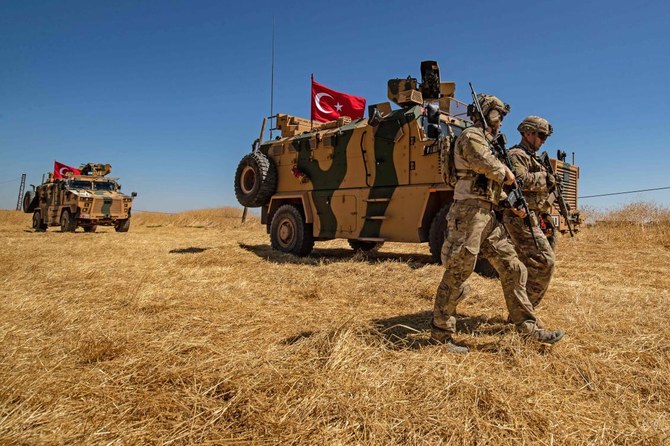BEIRUT: US-backed Kurdish-led forces in Syria said American troops began withdrawing Monday from their positions along Turkey’s border in northeastern Syria, ahead of an anticipated Turkish invasion that the Kurds say will overturn five years of achievements in the battle against the Daesh group.
The Syrian Kurdish fighters also accused Washington of failing to abide by its commitments to its key allies in the fight against Daesh. It’s a major shift in US policy.
The American withdrawal came just hours after the White House said US forces in northeastern Syria will move aside and clear the way for an expected Turkish assault — essentially abandoning Kurdish fighters who fought alongside American forces in the years long battle to defeat the Daesh group.
There was no immediate comment from the US on the pullout.
Turkish President Recep Tayyip Erdogan has threatened for months to launch the military operation across the border. He views the Syria Kurdish forces as a threat to his country as Ankara has struggled with a Kurdish insurgency within Turkey.
In the US, Republicans and Democrats have warned that allowing the Turkish attack could lead to a massacre of the Kurds and send a troubling message to American allies across the globe.
The Syrian Democratic Forces, as the Kurdish-led force is known, said the American pullout began first from areas along the Syria-Turkey border.
“The American forces did not abide by their commitments and withdrew their forces along the border with Turkey,” the SDF said in its statement. “Turkey now is preparing to invade northern and eastern parts of Syria.”
“The Turkish military operation in northern and eastern Syria will have a huge negative effect on our war against” Daesh, it added.
The Kurdish-led fighters have been the main US-backed force in Syria in the fight against Daesh and in March, the group captured the last sliver of land held by the extremists, marking the end of the so-called caliphate that was declared by Daesh’s leader Abu Bakr Al-Baghdadi in 2014.
“We will not hesitate for a moment in defending our people” against Turkish troops, the Syrian Kurdish force said, adding that it has lost 11,000 fighters in the war against Daesh in Syria.
A Turkish attack would lead to a resurgence of Daesh, it said. Daesh sleeper cells are already plotting to break free some 12,000 militants detained by Syrian Kurdish fighters in northeastern Syria in a “threat to local & international security.”
The Kurdish fighters also control the Al-Hol camp, home to more than 70,000 mostly wives and children of Daesh fighters.
Turkish Foreign Minister Mevlut Cavusoglu tweeted that since the beginning of the crisis in Syria, “we have supported the territorial integrity of this country, and we will continue to support it.”
He added that Ankara is determined to ensure the survival and security of Turkey “by clearing the region from terrorists. We will contribute to peace, peace and stability in Syria.”
The Kurdish Hawar news agency and the Britain-based Syrian Observatory for Human Rights also say American troops were evacuating positions near the towns of Ras Al-Ayn and Tal Abyad on Monday.


























